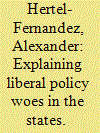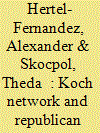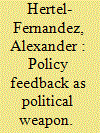|
|
|
Sort Order |
|
|
|
Items / Page
|
|
|
|
|
|
|
| Srl | Item |
| 1 |
ID:
146588


|
|
|
| 2 |
ID:
146106


|
|
|
|
|
| Summary/Abstract |
In the wake of the Citizens United Supreme Court decision, many American private-sector employers now have the legal right to recruit their workers into politics and to fire or discipline employees who refuse to participate. How many firms and workers are engaged in this kind of political recruitment and why? And how have the opportunities for the political recruitment of workers by their employers changed over time? Drawing on national surveys of top corporate managers and workers, as well as a review of the legal literature, I provide initial answers to these questions and illustrate the implications of employer political recruitment for a range of substantive and normative issues in American politics. My findings invite further research and discussion about this feature of the American workplace and its effects on politics and policy.
|
|
|
|
|
|
|
|
|
|
|
|
|
|
|
|
| 3 |
ID:
149367


|
|
|
|
|
| Summary/Abstract |
Presidential election years attract attention to the rhetoric, personalities, and agendas of contending White House aspirants, but these headlines do not reflect the ongoing political shifts that will confront whoever moves into the White House in 2017. Earthquakes and erosions have remade the U.S. political terrain, reconfiguring the ground on which politicians and social groups must maneuver, and it is important to make sure that narrow and short-term analyses do not blind us to this shifting terrain. We draw from research on changes since 2000 in the organizational universes surrounding the Republican and Democratic parties to highlight a major emergent force in U.S. politics: the recently expanded “Koch network” that coordinates big money funders, idea producers, issue advocates, and innovative constituency-building efforts in an ongoing effort to pull the Republican Party and agendas of U.S. politics sharply to the right. We review the major components and evolution of the Koch network and explore how it has reshaped American politics and policy agendas, focusing especially on implications for right-tilted partisan polarization and rising economic inequality.
|
|
|
|
|
|
|
|
|
|
|
|
|
|
|
|
| 4 |
ID:
165399


|
|
|
|
|
| Summary/Abstract |
Legislative staff link Members of Congress and their constituents, theoretically facilitating democratic representation. Yet, little research has examined whether Congressional staff actually recognize the preferences of their Members’ constituents. Using an original survey of senior US Congressional staffers, we show that staff systematically mis-estimate constituent opinions. We then evaluate the sources of these misperceptions, using observational analyses and two survey experiments. Staffers who rely more heavily on conservative and business interest groups for policy information have more skewed perceptions of constituent opinion. Egocentric biases also shape staff perceptions. Our findings complicate assumptions that Congress represents constituent opinion, and help to explain why Congress often appears so unresponsive to ordinary citizens. We conclude that scholars should focus more closely on legislative aides as key actors in the policymaking process, both in the United States and across other advanced democracies.
|
|
|
|
|
|
|
|
|
|
|
|
|
|
|
|
| 5 |
ID:
159490


|
|
|
|
|
| Summary/Abstract |
Scholars have shown that once in place policies can foster greater political participation. Indeed, politicians often deliberately design policies to shore up political support among their allies. But can political actors engineer the reverse effect, crafting policies that demobilize their rivals? Drawing on the example of conservative cross-state advocacy against public sector unions, I describe the strategy of policy feedback as political weapon, or when actors design policies to politically weaken their opponents. I then document that the passage of conservative network-backed legislation led to large and enduring declines in public sector union density and revenue. I further show that by curbing the power of public unions, the passage of conservative network-backed bills dampened the political participation of public sector employees. My findings emphasize the importance of considering how actors use policy to demobilize political opponents and explain why public unions are now on the defensive in state politics.
|
|
|
|
|
|
|
|
|
|
|
|
|
|
|
|
| 6 |
ID:
178289


|
|
|
|
|
| Summary/Abstract |
Strikes are a central tool of organized labor, yet existing research has focused on the economic consequences of strikes, rather than their political effects. We examine how labor actions by teachers, a well-organized group of public sector workers, affect mass attitudes about the strikes and interest in the labor movement more generally. Our context involves large-scale teacher strikes and walkouts in six states in 2018. Using an original survey in the affected states, we study the causal effect of strike exposure among parents whose children’s ages place them in or out of school. Firsthand strike exposure increased parents’ support for the teachers and for the labor movement, as well as parents’ interest in labor action (though not necessarily through traditional unions). Our results highlight the importance of strikes as a political strategy for unions: not only can they build stronger public support for the striking workers but they can also inspire greater interest in further labor action among other workers.
|
|
|
|
|
|
|
|
|
|
|
|
|
|
|
|
| 7 |
ID:
162853


|
|
|
| 8 |
ID:
134529


|
|
|
|
|
| Summary/Abstract |
Which policymakers are most likely to enact legislation drafted by organized business interests? Departing from the business power scholarship that emphasizes structural, electoral, or financial mechanisms for corporate influence, I argue that lawmakers are likely to rely on businesses' proposals when they lack the time and resources to develop legislation on their own, especially when they also hold an ideological affinity for business. Using two new datasets of “model bills” developed by the American Legislative Exchange Council (ALEC), a policy group that promotes pro-business legislation across the states, I find strong support for this theory. These results indicate that ALEC provides private policy capacity to state legislators who would otherwise lack such support, and relatedly, that low state policy capacity may favor certain organized interests over others—namely the business interests affiliated with ALEC. My findings have implications for the study of business influence in policymaking, as well as for state politics.
|
|
|
|
|
|
|
|
|
|
|
|
|
|
|
|
|
|
|
|
|